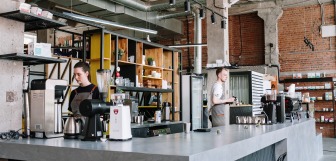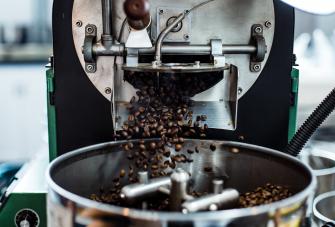What’s the Difference Between Coffee Shops and Cafes?
When we wake up in the morning, the first thing many of us turn to is a steaming hot cup of tea or coffee. For those of us with a little less time to spare, finding ourselves standing in the line at a coffee shop or cafe is a daily occurrence.
While in that line, we may be stuck with the thought, “what’s the difference between coffee shops and cafes anyway?” While they may seem just seem like two names for one thing, they do have their differences.
In this blog, we’ll go into what sets the two titans of the hospitality industry apart, their respective histories, and the best business practices for both.
History
Coffee shops and cafes have histories that stretch hundreds of years and unsurprisingly both have their origins in the selling and drinking of coffee. While there’s evidence that coffee was prepared in Ethiopia prior to the 1400s, the first solid evidence we have of the drink comes from the 15th century [1]. After it was imported from Ethiopia into Yemen, it began to spread throughout the Middle East before arriving in Europe through Italy in 1600 [2].
The first European coffee shop opened its doors in Rome in 1645 after Pope Clement VIII declared coffee to be a “Christian drink” [3]. Coffee shops, or coffee houses as they were originally known, quickly became very popular meeting places for high-born and common people alike. Groups would often meet to discuss ideas both political and philosophical and soon there were multiple coffee shops in every major city and town across the known world [4].
While there’s no concrete date for when cafes began to grow out of coffee shops, it can be assumed that they came about quickly after. Cafe is an English word borrowed from the French ‘café’ which literally translates to coffee. In the context of a business, cafes can be thought of as coffee shops with a wider range of food.
There is also a culture of “greasy spoon” cafes in the United Kingdom and North America. These greasy spoons are essentially restaurants that serve diner food [5].
Cafes and Coffee shops have grown to become some of the most popular hospitality establishments in the world today. There are over 15,000 cafes and coffee shops in the UK alone [6] and that number is only sure to rise.
What are the differences?
If you’re planning to start a coffee shop and become a professional coffee roaster, it’s useful to know the difference between them and cafes. The two words are sometimes used interchangeably so it’s easy to get confused.
In general, the main difference between the two is the food and drink they sell. Coffee shops tend to focus on coffee-based drinks and food that can be quickly eaten on the go. In dedicated coffee shops, you will find a number of specialized drinks such as espressos, and different ways of roasting and preparing coffee [7].
The continued popularity of coffee prepared by hand has led to the rise of artisan coffee shops. These specialist shops are very particular about everything from the ethical sourcing of their coffee beans to the exact temperature of their hot water [8].
In many ways, a cafe could be thought of as more of a restaurant than a coffee shop. While they will usually still serve coffee, traditional cafes such as Paris’ Café Procope (the oldest cafe in Europe) have extensive menus [9]. This focus on food can also be seen in the tradition of ‘greasy spoon’ cafes in the UK and North American that we mentioned above.
These rules however are not set in stone and there can be a lot of variation from town to town and country to country. There are coffee shops that serve cafe-quality food and cafes with tiny menus. Starbucks, the most popular coffee shop chain in the world [10], defines itself as a coffee shop despite offering a wide range of food.
The best business practices for both
If you’re planning to open a coffee shop or a cafe, it’s important to know the dos and don’t. While you could get into the nitty-gritty details thinking everything from the tip jar to toilets, we’re going to focus on the broad strokes of what the best business practices are.
The first thing to remember is that despite their differences, coffee shops and cafes are both parts of the hospitality industry. This means that your customers will have certain expectations of the service and products on offer. Make sure you do your research and see how you can create a great hospitality experience in your coffee shop or cafe.
Finding the perfect venue location is extremely important. Until you have an established group of returning customers, your business will rely on foot traffic and word of mouth. Ensure that when you’re searching for a venue that you choose a place popular with the demographic you're aiming for with a lot of foot traffic. For instance, if you’re trying to catch that morning commuter rush, try and find somewhere near a train or bus stop.
Once you’ve found your venue and designed your customer experience, it’s time to start thinking about your menu. If you’re focussing on your coffee, make sure you’ve sourced the best beans possible and perfected your recipe. If you’re hiring baristas, make sure they can work quickly without sacrificing the coffee quality. For Cafes, either hire an experienced chef that can help you design a delicious menu or study the menus of popular cafes and see what you can adapt.
The best hospitality EPOS system
Whether you’re a coffee shop or cafe owner or manager, it’s important to choose the right POS system for your business. The Epos Now complete hospitality system offers a complete POS that will help your business thrive. Or, choose the more specialized Epos Now Cafe Solution if that’s your niche.
Epos Now’s dedicated systems allow you to organize your staff, check your inventory, and streamline your processes all from one terminal. Over 40,000 businesses worldwide trust Epos Now to provide an unbeatable service.
Get in touch and find out how we can help your coffee shop brew up something good today.




